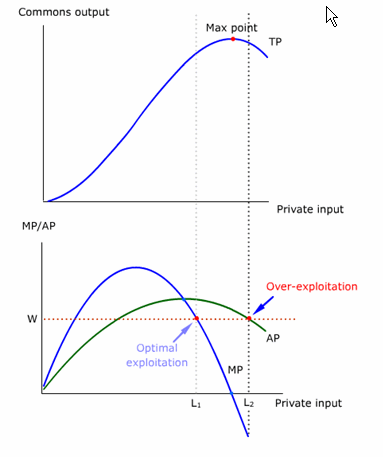The Tragedy of the Anticommons
When too many individuals have the right of exclusion to a scarce resource, and no one has an effective privilege of use, under-utilization may occur.
Several years after the 1994 Kobe earthquake, much of the city still lay in rubble due to Japan's land laws enacted after World War II. Under these laws, some land in Kobe has been divided to the point where there are thousands of parcels the size of a U. S. garage. A building can be based on a plot that is actually dozens of small parcels thrown together by developers. In one block of Kobe, over 300 renters, lessees, landowners, and subletters own often-overlapping claims, and each one must agree before rebuilding can go forward (WSJ, 12/12/1996).
Here is a classic tragedy of the anticommons. An anticommons occurs when too many individuals have rights of exclusion in a scarce resource. The tragedy is that rational individuals, acting separately, may collectively waste the resource by under-utilizing it compared to a social optimum. An anticommons is a mirror image of a commons where too many individuals have privileges of use (or the right not to be excluded) in a scarce resource. The tragedy of the commons is that rational individuals, acting separately, may collectively over-utilize a scarce resource. In both anticommons and commons, there is no hierarchical relationship among owners such that the decision of one particular single owner can dominate those of other owners.
In an anticommons, individuals exercising the right of exclusion hope to gain by holding out for a better offer. The lower the cost of holding out, the longer it takes to achieve the minimum viable parcel size for more profitable use. In the case of Kobe, the city could conceivably evict any tenant or landlord and buy the land under laws of eminent domain. But Japanese authorities frequently decline to seize property because of the nation's preference for harmony and consensus. Property rights economists maintain that how property rights are assigned is not important as long as the rights are clearly defined and the transaction costs of transferring property rights among owners are zero. The Kobe example clearly illustrates that transaction costs in the real world are nowhere near being zero.
A more insidious example of anticommons occurs when the core bundle of property rights (including possession, personal use, and transfer) to the same scarce resource are assigned to different individuals. These cases are quite common in countries emerging from communist rule where a new set of market ownership rights are simply superimposed on existing socialist and informal use rights.
References:
- Heller, M. A. "The Tragedy of the Anticommons," Harvard Law Review, January 1998.
- Sapsford, J. "Quake-hobbled Kobe Shows How Land Law Can Paralyze Japan," Wall Street Journal, 12/12/1996.
Glossary:
- tragedy of the commonsTragedy of the commons occurs when over-exploitation of a limited-capacity resource due to unrestricted entry leads to its total collapse.

- use rightThe right to derive value from using the good for self consumption as contrasted to selling it for money. For example, de facto property rights usually cannot be sold for money. In other words, these de facto rights are use rights that have only use value but not exchange value.
- property rightThe control over the use or transfer of a resource. Property right is conducive to efficient use of scarce resources as owners have an incentive to maximize their long-term returns.
- transaction costThe accessory cost associated with completing a market transaction other than the posted price of the traded item itself. It covers many things including information discovery cost, legal fees, negotiation cost, and even transportation cost. In general, any similar barrier or friction.
Topics:
Keywords
anticommons, bundle, commons, exclusion, holding out, inclusion, Kobe, land, property rights, tragedy, transaction costs
